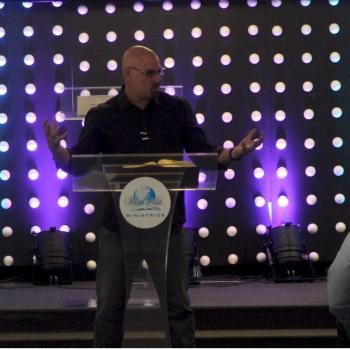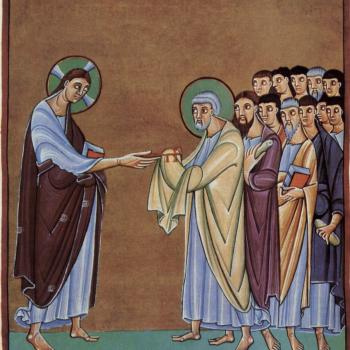By Joseph Lumbard - May 14, 2009
Despite his infamous remarks at Regensburg in 2006, or perhaps because of them, Pope Benedict XVI has done much to advance Catholic-Muslim dialogue during his brief tenure. He is the first Pope to have visited more than one site of Muslim worship, first the Blue Mosque in Istanbul in 2006, and now the King Hussein II Mosque in Amman, Jordan and the Dome of the Rock in Jerusalem. Such gestures, combined with establishing the new Catholic-Muslim Forum, have done much to counter the deleterious effects of his unfortunate remarks in Regensburg in September 2006 and to bring forth better understanding and cooperation between Muslims and Christians. For as Pope Benedict XVI stated in the final address of the first meeting of the Catholic-Muslim forum, held in November 2008:
There is a great and vast field in which we can act together in defending and promoting the moral values which are part of our common heritage. We should thus work together in promoting genuine respect for the dignity of the human person and fundamental human rights, even though our anthropological visions and our theologies justify this in different ways.
While some Muslim groups remain upset that the Pope did not issue a formal apology, many Muslims have been heartened by His Holiness' expression of "regret" for the pain that the Regensburg lecture caused Muslims. As Prince Ghazi bin Muhammad of Jordan said in his address honoring the Pope's visit:
Muslims know that nothing said or done in this world can harm the Prophet (may peace and blessings be upon him), who, as his last words attested, is with the Highest Companion - God Himself - in Paradise, but Muslims were nevertheless hurt because of their love for the Prophet (may peace and blessings be upon him), who is, as God says in the Holy Koran, closer to the believers than their own selves (Al-Ahzab, 33:6). Hence, Muslims also especially appreciated the clarification by the Vatican that what was said in the Regensburg lecture did not reflect Your Holiness' own opinion, but rather was simply a citation in an academic lecture.
Appreciation for the place of the Prophet Muhammad in the Islamic tradition may in fact have been what inspired His Holiness to visit the Dome of the Rock, from which the Prophet Muhammad is said to have ascended through the heavens, "Until he was within two bows' length or nearer." (Qur'an 53:9) Pope Benedict XVI's efforts to honor Muslim places of worship and to better respect the place of Muhammad within Islam should be heartening to Muslims and non-Muslims alike. For of all the misunderstandings between Muslims and Christians, none has led to greater pain and consternation than the misrepresentations and misinterpretations of Muhammad. For Muslims, he is the firmest bond, who will intercede on our behalf, who is dearer to us than our own selves, and of whom God has said: "Indeed you have in the Messenger of God a beautiful example for those who hope for God and the Last Day and remember God much." (Qur'an 33:21) No one can expect the Pope to agree with this position, but to honor its place in Muslim belief and practice is an important, if not vital, step towards greater cooperation between Christians and Muslims the world over.
Such gestures are all the more important when one considers that although His Holiness is a Spiritual Leader, a theologian and a Head of State, it is as a humble pilgrim that he visits the Holy Land. In beginning his pilgrimage in Jordan, he has begun in a land where Muslims and Christians have lived in peace for over a thousand years. They have fought together since 630 CE and suffered together under many forms of occupation. The deep respect afforded Christianity in Jordan has led to the rehabilitation of the Jesus' Baptism Site at Bethany Beyond the Jordan (John 1:28 and John 3:26). In this way, the Jordanians have responded to the call of the Quran to defend "monasteries, churches, synagogues, and mosques wherein God's Name is mentioned..." (Quran, 22:40)
Given the historic place of Christians and Christianity in the Holy Land, Muslims and Christians are saddened by the steady decline of Christianity in both Jordan and Palestine. In the Pope's pilgrimage and in his call for an independent Palestinian state, one hopes that he will have helped to demonstrate the respect that people of faith must have for one another and to reaffirm the historic and spiritual bond between Christians and Muslims in the Holy Land. Most importantly, one hopes that Christians, Jews and Muslims will heed his call to recognize Jerusalem as the "spiritual home to Jews, Christians and Muslims."
Joseph Lumbard, assistant professor of classical Islam at Brandeis University, researches Islamic intellectual traditions with an emphasis on Sufism and Islamic philosophy. He is the editor of "Islam, Fundamentalism, and the Betrayal of Tradition" (World Wisdom, 2004), a collection of essays that examines the religious, political and historical factors that have led to the rise of Islamic fundamentalism.
1/1/2000 5:00:00 AM




